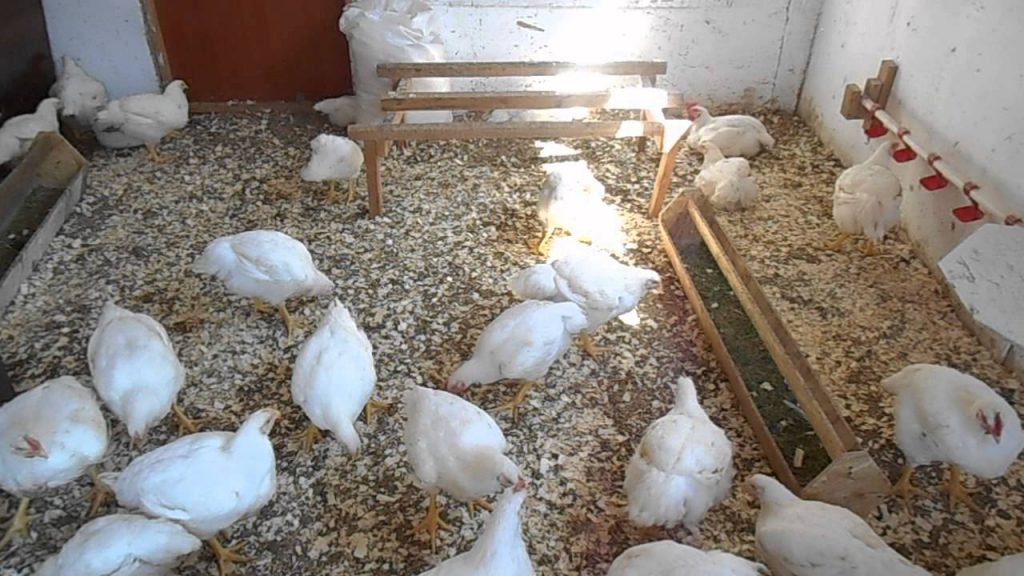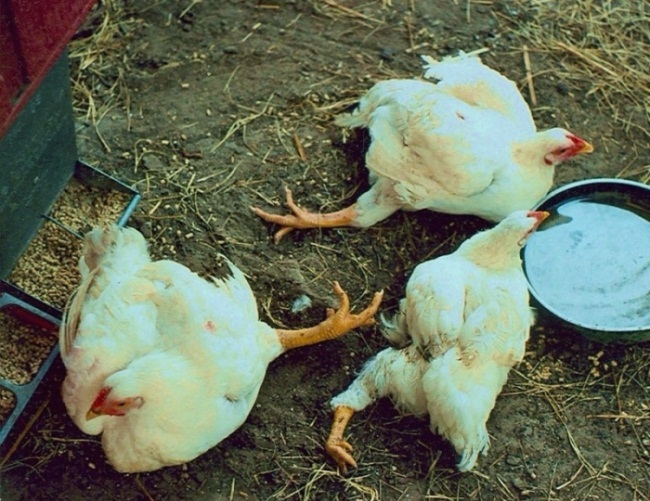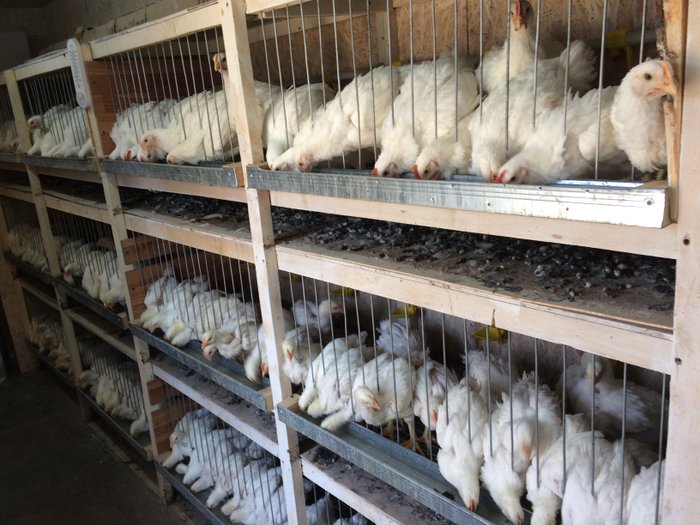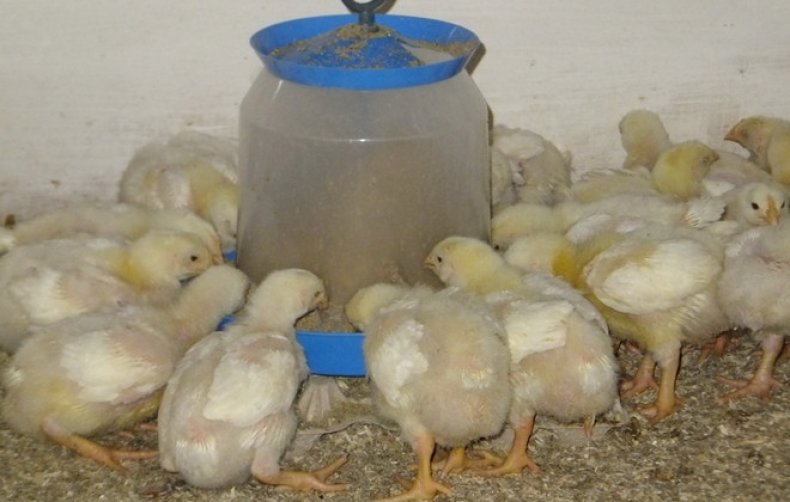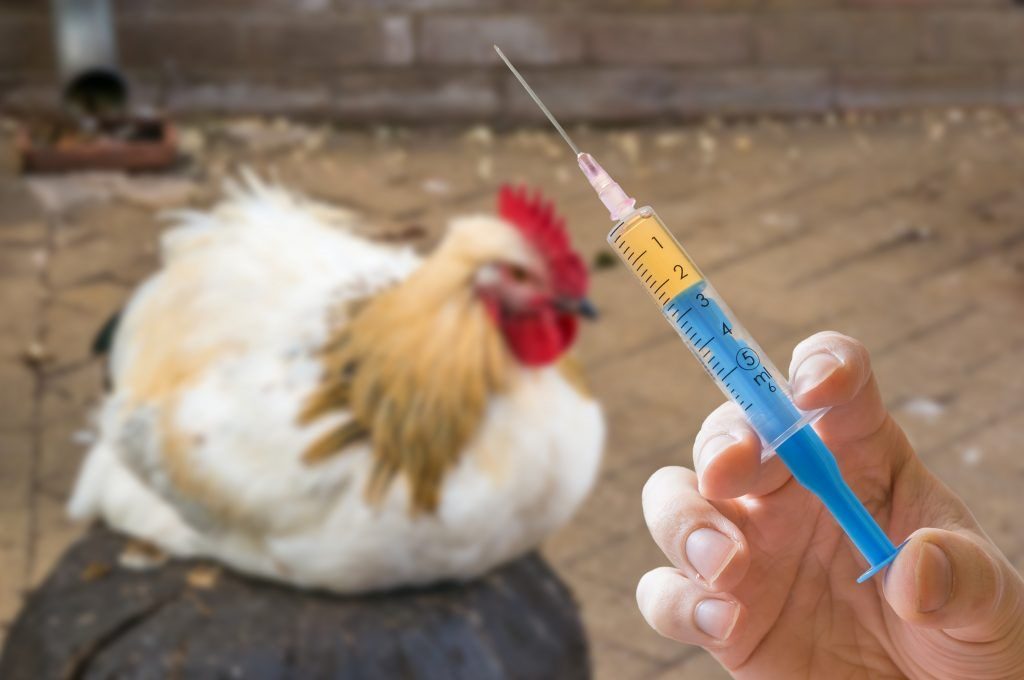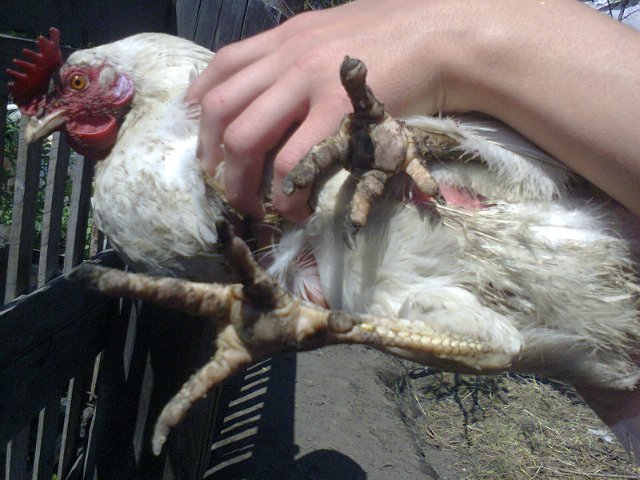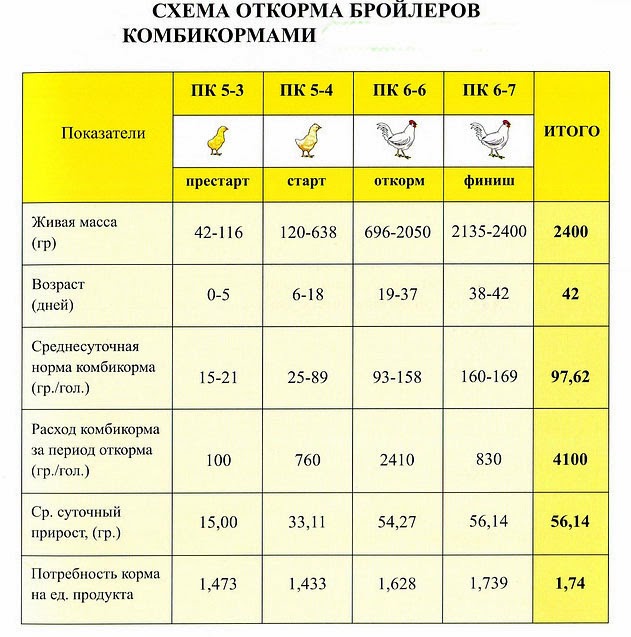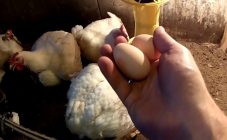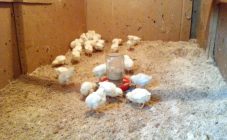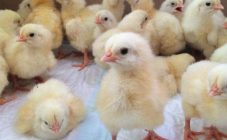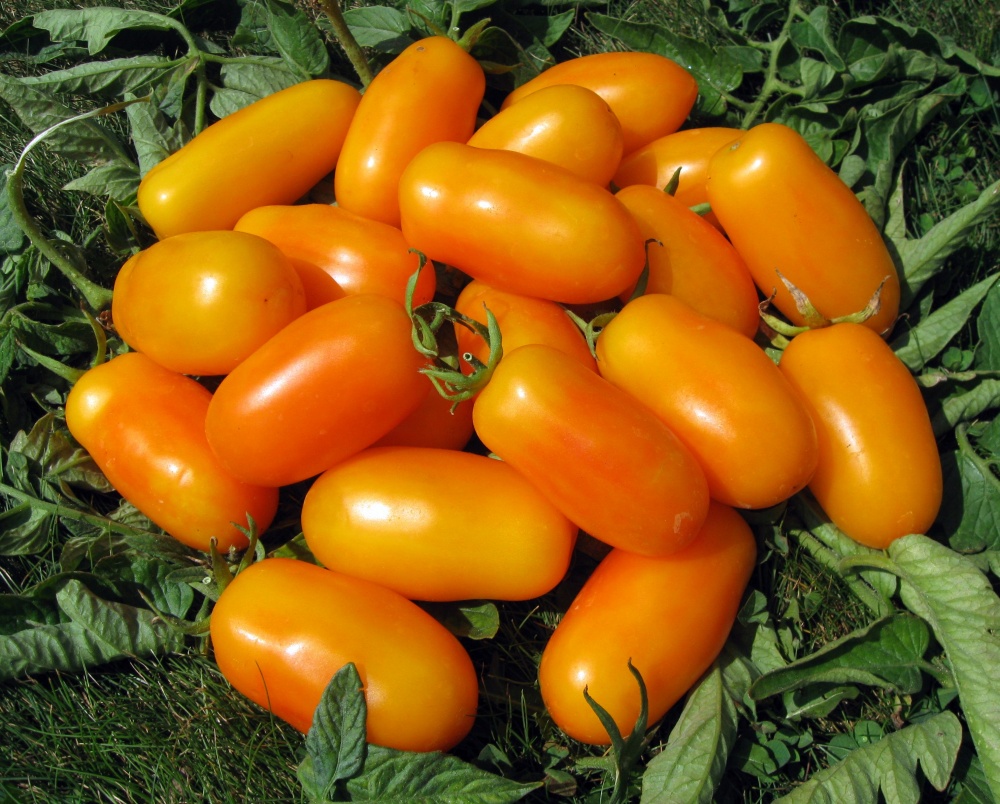Content:
Breeding broilers is a fairly profitable business that allows you not only to eat natural products, but also to receive monetary rewards when selling meat. The crosses are in great demand due to their fast weight gain. The bird gains most of its weight in just 2-3 months. A significant advantage of broilers is their endurance, a high level of resistance to various ailments in comparison with other breeds of chickens. However, even these birds can be struck by an illness, as a result of which broilers fall to their feet.
General rules for caring for boilers at home
In crosses, the skeleton and the muscles attached to it grow intensively. Mass is quickly gained by limiting the movement of the bird. Any deviations from maintenance technologies provoke the development of complications in the bronchopulmonary and skeletal sectors. An accurate diagnosis must be made by a veterinarian. It is unacceptable to independently prescribe drug therapy and vaccinate.
The development of musculoskeletal tissues can be influenced by factors such as:
- unbalanced diet, namely the intake of an insufficient amount of vitamins A, E, D;
- lack of calcium;
- unacceptable climatic conditions in the poultry house;
- exceeding the permissible number of individuals per sq. m. premises;
- non-compliance with hygienic requirements for the content of crosses.
When broilers fall to their feet due to insufficient care, it is quite easy to get out of this situation by adjusting the life of the bird and adjusting the diet. The broiler should get vitamin D from fish oil and daily outdoor exposure. Ultraviolet rays allow the formation of a vitamin that prevents the development of rickets.
In cases of excess vitamin A, the bird may fall to its feet. With a lack of the same vitamin, a similar situation occurs. To reduce vitamin hunger, experts recommend feeding the chickens with finely chopped green grass starting from the third day after birth. In the future, you can tie up the grass like brooms, and the chickens will happily peck on nutritious greens.
Calcium deficiencies can be supplemented with eggshells, shells and chalk, which should be added to the broiler diet. Some poultry farmers argue that slaked lime is most effective in this case, which has been in the container for a long time and has reached a dry state.
It is imperative to maintain a comfortable house temperature. Babies will be warm at 32-34 ° C, and 16 ° C will be enough for one-month-old young.
When the chicks are comfortable, they will begin to behave calmly. When young individuals cluster together, we can say that the bird is cold. In hot conditions, broilers will spread out on pallets and spread their wings. The recommended humidity level is 75%.
It is necessary to control the dryness of the litter, the thickness of which should be within 10 cm. As a rule, the top layer is removed every 3 days. When ventilating the house, it is necessary to exclude drafts. On each sq.m.it is permissible to accommodate no more than 10 adults.
Possible reasons
Often inexperienced poultry farmers wonder why broilers get on their feet. Experts refer to the main reasons for falling broilers to their feet:
- Wrong diet. It is very important to provide a balanced menu from the first day of a bird's life. In the event that any vitamins and minerals are not able to be absorbed, the chick may begin to fall to its feet. As a rule, this happens due to a lack of vitamins E and A, as well as calcium. Full absorption of calcium by the body is possible only if you receive a sufficient amount of vitamin D.
- Violations of the conditions for keeping poultry. From day 21, broilers need walks in the open sun, which will provide them with the necessary level of vitamin D. When raising poultry in winter, it is necessary to provide it with a diet enriched with vitamin D, which will make up for the lack of a useful element in the body. Often, novice poultry farmers do not control the temperature in the poultry house, the degree of humidity, which leads to various colds in broilers.
- A large number of individuals per 1 sq. M. provokes the development of ailments in young animals. It is very important for chicks to move freely and stay in the fresh air as much time as possible. Broilers should also receive the required amount of light. Stiffness and restriction in movement lead to a sharp increase in body weight, and the legs, which have not yet fully strengthened, are not able to withstand the large weight of the bird. Due to the rapid mass gain, the paws of the crosses part and soon they lose the ability to stand and move. How to treat broilers if their legs are spreading? If the reason lies in improper maintenance, it is advisable to expand the house and walking area. If there is enough room, the bird may be sick.
- Viral diseases often provoke a fall on the legs of broilers. When a bird is ill, purulent discharge from the eyes and nose is observed. Disorder of the gastrointestinal tract provokes loose stools. As soon as a sick individual was found, it must be urgently isolated from the main group of young animals. During this period, it is recommended to visit the broiler house as often as possible and to keep the health of the remaining birds under control. Quite often, a viral illness is fatal.
- Severe stress in a bird can cause a sharp change in diet, isolation from other individuals.
- Arthritis is a joint disease that requires timely treatment. The skin of the crosses in the hock area turns red. Arthritis can affect both young and old broilers. Quite often, the large body weight of the bird becomes the cause of the disease.
Broilers and chickens have legs failing: how to treat, what to give
Emergency care for chicks and adult chickens must be provided in the first 5 days after the onset of symptoms.
For a long time, farmers have used vodka to treat poultry. The chick that fell on its paws was buried in the beak, 2-3 drops of alcohol. During the first day, the baby, as a rule, rose. He had a good appetite and was quite active. The method of treatment is certainly controversial, but quite effective.
Treatment of monthly broilers
At the age of 30 days (month), broiler chickens can get rickets, which will cause the chicks to fall to their feet. The therapy of young animals in this case is carried out using tricalcium phosphate, fish oil and vitamin D3. Useful elements are added to the feed.
If there are no serious reasons for the depletion of a month-old bird, tricalcium phosphate, which contains calcium and phosphorus, will have a beneficial effect on the body of chickens in a short period of time. The birds will need a dosage of 2% of the total weight of the daily diet.
Treatment of adults
An adult bird is quite often affected by arthritis, which causes joint problems. For therapy, veterinarians in this case use ampicillin (for each kg of chicken weight, 20 mg of the substance will be required).
The drug can be added to both feed and drinking water.
Answers to common questions
Broilers have swollen leg joints
Arthritis is an inflammatory process of the bursae of the joints, which usually affects young animals. Quite often, the disease develops against the background of mechanical damage, lack of a balanced diet, a rare change of litter in the poultry house, a large number of broilers in a small room. Also, arthritis can be caused by a virus or bacteria that has entered the body. The main symptoms of arthritis include:
- lameness;
- enlarged joints of the legs (the paws begin to swell greatly and gradually fail);
- excessive perseverance of chickens in one place;
- high temperature of the joints, which is felt to the touch.
The bird experiences severe pain when moving, so it prefers to perch for days. For the treatment of the disease, experts recommend using ampicillin (5-10 mg per 1 kg of chicken weight), polymyxin M sulfate (0.5 mg diluted in drinking water), sulfadimethoxin (100 mg of the substance per kg of broiler weight is mixed with feed). The duration of drug treatment is 5 days. Chickens can die massively from arthritis if timely treatment is not started.
Broilers limp
Lameness can be caused by trauma to the paw, which is not uncommon when keeping chickens in cages. In addition, lameness can be a sign of kidney problems. In this case, the lameness of the chicken increases more and more every day. With kidney problems in chickens, the following symptoms are observed:
- lameness;
- trembling in the paws, which gets worse every day;
- swelling of the joints, in which the paws look large and begin to twist;
- immobility (the bird experiences pain when moving, so it prefers to lie down).
In cases when the crosses cannot stand up and the chick begins to limp strongly, it is necessary to inspect the birds for mechanical damage. Sick individuals should be isolated from other chickens.
If the broiler does not stand up - what to do in this case, how to overcome lameness? To begin with, a sick individual must be examined for mechanical damage. Place the bird in a separate room.
Treat cuts with hydrogen peroxide and greenery. In the absence of visible damage, a veterinarian should be called to help establish an accurate diagnosis and prescribe an effective treatment.
Broilers have blue legs
With a strong lack of vitamin E, the skin of chickens begins to turn blue. To help broilers, you should feed them vitamins and minerals every day. It is also worth adding fishmeal, egg yolk, a small part of milk, vegetable oil, a little sprouted grains of wheat and oats to the diet.
Broiler chickens do not walk well
When chicks cannot walk well, the cause must be found in poor nutrition, which leads to kidney and liver failure.In addition, an insufficiently balanced diet can lead to heart damage. Treatment in this case should be prescribed by a veterinarian. In addition to therapy, it will be necessary to give the chicks vitamins Tetravit, reduce the amount of animal fats on the menu and give sprouted wheat grains daily. It is important to give water to a sick bird in a timely manner. Failure to follow the doctor's prescriptions can cost the chicks their lives.
Prevention of depletion of broilers
To prevent the development of broiler diseases, preventive measures should be followed.
- The bird's diet should include all the components that a bird needs for full growth and development. You should definitely add homemade eggs (yolk) to the diet.
- It is very important to observe the correct conditions of detention.
- Egg breeds of chickens require a large housing and a spacious area for walking. Constant movement can help prevent obesity and arthritis. Due to overcrowding, any virus will quickly spread throughout the house and cause a massive drop in broilers.
Keeping broilers involves following rules such as systematic cleaning in the house, organizing the correct diet and ensuring long walking. If you ignore these recommendations, the risk of a certain disease increases, which leads to the bird falling to its feet.
